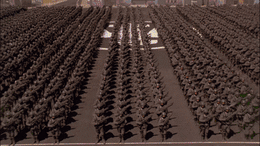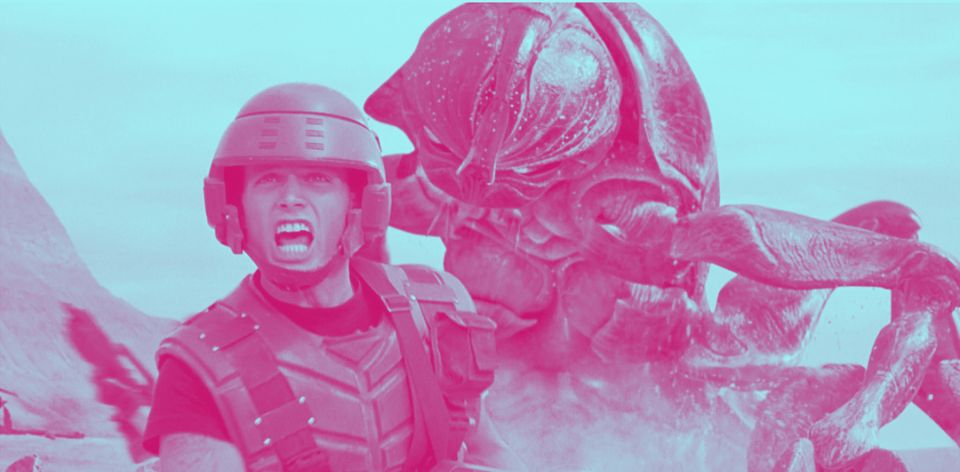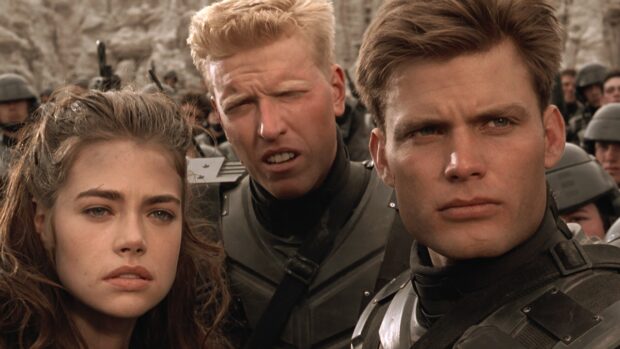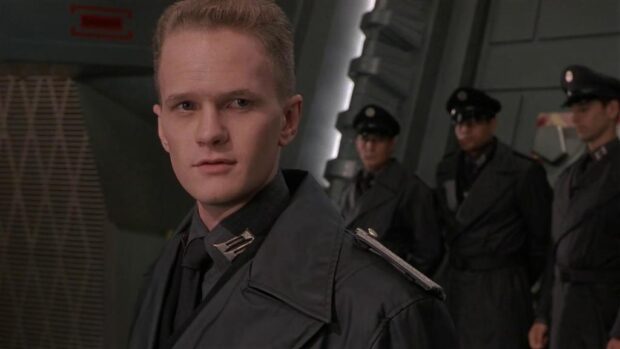“When the executives finally saw it, they said: “Their flag – it’s a Nazi flag!” recalls Paul Verhoeven in a 2018 interview. “I said, ‘No … it’s completely different colours.'” Which is about the most Verhoeven thing we can imagine, short of it also containing some reference to female nudity.
For many, STARSHIP TROOPERS is the ultimate Paul Verhoeven film*. There’s certainly a case for that. As the penultimate film in his ‘Hollywood era,’ at least until this point, it contains much of the satire, ultraviolence and nudity that defined the decade of releases before it. Plus: bugs!
Following the (unfairly) critically maligned Showgirls (1995), Verhoeven re-teamed with Robocop scribe Edward Neumeier for a film that rapidly escalates, skewers, and eviscerates. Based on Robert Heinlein’s book of the same name, it is the second adaptation of the material following the six-episode Japanese OVA locally titled Uchū no Senshi, with designs by Macross legend, Kazutaka Miyatake.
Development on the live action film began as a project called Bug Hunt at Outpost 7 in 1991. “I wanted to do a big, silly, jingoistic, xenophobic, let’s-go-out-and-kill-the-enemy movie, and I had settled on the idea that it should be against insects,” said Neumeier in The Making Of Starship Troopers book. “I wanted to make a war movie, but I also wanted to make a teenage romance movie.”
Which is effectively what we get in the final product. In the 23rd century, the United Citizen Federation is a military-based power that only grants basic rights to citizens, and military services against the nebulous ‘bugs’ guarantees citizenship. The film follows Johnny Rico (Casper Van Dien) — along with his girlfriend and aspiring pilot Carmen Ibanez (Denise Richards), fellow infantryman Ace Levy (Jake Busey) and military intelligence psychic Carl Jenkins (Neil Patrick Harris) — and their exploits in the Mobile Infantry fight.
Given the presence of screenwriter Neumeier, STARSHIP TROOPERS is immediately brushed with the same parodical stuff as Robocop. By ‘brushed’ we of course mean slaps you across the face with a satirical commercial for the fictional Mobile Infantry that is also shot-for-shot tribute to Leni Riefenstahl’s Triumph of the Will (1935). It sets the tone for a Heinlein maneuver at the place where jingoism and fascism meet, join forces to blow shit up, and then celebrate by rolling around in the remaining viscera. All you need to do is look at the uniform Neil Patrick Harris rocks up in to see what Verhoeven is skewering.
Hollywood has a long history of waving the flag in the name of military support. From the Second World War movie machine through The Green Berets (1968) to Top Gun (1986) and its recent sequel, there’s tangible connections with an approving military. If you look at the basic elements of something like Captain America: The Winter Soldier (and certainly the Falcon and the Winter Soldier series), there is a tacit endorsement of a militaristic approach. Even when the films are anti-authoritarian, or just ridiculous amounts of fun, they are still necessarily pro-militarisation. (Marvel isn’t alone in a critique about Pentagon partnerships, as it is one that could be applied to most action blockbusters).
So, it would be folly to mistake STARSHIP TROOPERS for an endorsement of these things, even with the hoo-rah action scenes. This is a critique of US foreign policy, even four years before the never-ending war on terror began, and a rare action film that skewers the military-industrial complex rather than working with it hand-in-hand. In fact, here we are 25 years later and the satire feels even sharper. Verhoeven and Neumeier are presenting us our action heroes, and they just happen to be fascist. Perhaps it is simply that Verhoeven doesn’t give one damn about subtly.
Given the emphasis on frenetic action, it’s amazing how many of the visuals hold up. Yes, there’s the odd bit of CG that dates it right to the exact late-90s minute. There’s also magnificently staged battle sequences of bugs swarming over walls, the kind of scenes that Peter Jackson would trademark a few years later, that still manage to wow on modern screens. It kind of makes me wonder what Verhoeven would have made of the ill-fated Crusade with Arnold Schwarzenegger.
At the start of an era where it was easier to get violence over the censorship line than nudity, Verhoeven drops in casual all-gender shower sequences and sex scenes like he’s back in the Netherlands knocking out another Soldier of Orange. All you needed was Rutger Hauer as a lieutenant leading grunts over a hill, but that would also mean that we don’t get to spend another few hours with the legendary Frederick Reginald “Michael” Ironside. Casual nudity and violence in over-the-top plots were so commonplace in the 80s, they just seemed incongruous by the time we got to the late-90s. It’s glorious in its way.
Taken in the context of his broader work, including films that span from sex comedy to faith-based eroticism, STARSHIP TROOPERS sits comfortably as a culmination of the the middle chapter of Verhoeven’s career. There would still be Hollow Man left to go before Verhoeven took a long break and went back to Europe, but in every other way this was a hard line under a run that began a decade earlier with Robocop. It was almost as if Verhoeven had been given exactly a decade to blow up Hollywood before returning to his home planet.

*They are all wrong, of course. Showgirls is the ultimate Paul Verhoeven film.






